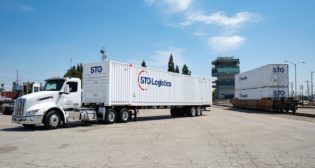
CP, KCS to STB: CPKC ‘Compellingly in the Public Interest, Should Be Approved Without Conditions’
Written by William C. Vantuono, Editor-in-Chief
KCS and CP locomotives at the top of the westbound grade at the Continental Divide in Crowsnest Pass, Alberta. Photo by David Duffin
The document exceeds 4,300 pages: Canadian Pacific’s and Kansas City Southern’s Surface Transportation Board filing on their merger: “Applicants’ Response to Comments and Requests for Conditions, Opposition to Responsive Applications, and Rebuttal in Support of the Application.”
The entire filing can be accessed from the STB website. The Filing ID is 304973. Here’s a summary of the points that CP and KCS make in response to the numerous comments and condition requests various parties have thus far filed with the STB:
“As we demonstrate in the Application and the evidence and argument submitted herewith, the Application is compellingly in the public interest and should be approved without conditions beyond those embodying the commitments Applicants are making … to ensure that the public interest benefits of the combination of CP and KCS come to pass,” the merger partners say in their introduction. “The transaction is supported by hundreds of shippers, short lines, passenger rail interests, labor organizations, and others. No shipper or shipper association requests that the transaction be denied. The Federal Railroad Administration endorses Applicants’ Safety Implementation Plan. Amtrak and other passenger rail interests support the transaction. Amtrak stresses ‘CP’s excellent record as an Amtrak host railroad and CP’s commitments to Amtrak’s efforts with states and others as detailed in the agreement’ reached between Amtrak and CP, and believes that the CP/KCS transaction ‘promises significant public benefits for the U.S. rail network.’ What opposition there is comes principally from the five Class I railroads. The protection these Class I railroads seek is itself evidence that they see the CP/KCS transaction an injecting new competition into the North American rail network.”
Point By Point
• “The transaction will result in significant public benefits. There is no merit to claims by Class I rivals that CPKC will not provide valuable new competitive options. The Class I critique of CPKC traffic estimates misses the fundamental point that the stronger competition that comes with the transaction is what really matters. [Our] estimates of the traffic CPKC will attract are reasonable and sound [and] are validated by the transaction’s Extensive shipper support and real-world developments. The KCS Board’s highly conservative pre-agreement synergies Estimates do not Undermine applicants’ anticipated benefits. There is zero risk to CPKC’s financial viability and continued investment, regardless of how much new traffic is attracted to the CPKC system, or at what rates. The Class I critique of the operating efficiencies generated by the transaction is invalid. CN’s continuing criticisms of the operating plan lack merit and are irrelevant to the Board’s evaluation of the transaction’s impacts.
• “There is no basis for concern about ‘vertical’ competition. The Board has extensive experience with end-to-end mergers and the net benefits they have brought. Commenters offer no new economic or other learning that calls into question the Board’s consistent precedents and factual conclusions. KCS has not used its control of Tex Mex and KCSM to foreclose UP or BNSF routings through the Laredo Gateway, and neither will CPKC. The same forces that ensured there was not foreclosure following KCS/Tex Mex and other cases will apply here. [Our] commitments—enforced as appropriate by shippers—are the tried-and-true way to address concerns about vertical foreclosure. The rate-setting mechanism proposed by UP and BNSF is both unnecessary and would be affirmatively anticompetitive. Shipper group desires for “open access” and other reregulatory remedies are not merger-related. Certain requests relating to “gateways” and “bottlenecks” represent an improper effort to revisit the Board’s bottleneck rate rules. Requests for “reciprocal switching access” are similarly unrelated to this transaction
• “The transaction will not lead to service disruption. Additional service-related conditions would unduly burden CPKC’s competition for no valid purpose.
• “Basic features of the transaction will prevent CPKC traffic growth from overwhelming rail capacity. The transaction will not cause disruption on the Lines KCS shares with UP and BNSF in Texas. UP and BNSF proceed from the false premise that CPKC Needs their permission to Use shared trackage to compete against them. The facts show that CPKC’s potential new trains will not exceed capacity on UP/BNSF trackage rights segments in Texas. There will be no capacity shortfall in the Houston Terminal complex. There is adequate capacity on the UP-owned Lines between Houston and Beaumont. Concerns about the Neches River Bridge at Beaumont are unwarranted. There is adequate capacity on the UP-owned Lines between Victoria and Robstown. UP and BNSF demands that CPKC fund 100% of any new infrastructure is overreaching and inappropriate. There will be adequate capacity for the traffic that CPKC hopes to attract elsewhere on its network.
• “The transaction will not adversely Impact Metra’s commuter services and will not meaningfully increase freight traffic on lines shared with Metra. Metra further misunderstands the transaction’s impacts because its expert’s RTC model is fundamentally flawed. The MD-W Line west of Bensenville Yard has ample capacity to accommodate eight additional daily freight trains. Developments independent of the transaction will further improve the performance of Metra’s trains on lines shared with CP, which values its partnership with Metra and regrets that Metra’s comments have mischaracterized Metra’s solid performance on lines shared with CP. Metra has consistently performed well on CP’s lines. CP leadership is committed to supporting Metra’s operations, consistent with its contractual obligations. None of Metra’s complaints about CP are related to the transaction; most of Metra’s pre-transaction dispatching concerns relate to operations that will be unaffected by the transaction. Dispatching Metra trains on the ‘wrong track’ is a pre-transaction concern without merit. Pre-transaction issues having no bearing on this proceeding. Metra’s complaints about PTC implementation issues are irrelevant and unfair. [We] are committed to reassure Metra and its ridership that the transaction will not impact Metra’s passenger service. Metra’s requests to force a shift of dispatching to Metra would override CP’s contractual rights and undermine rather than improve the handling of Metra trains. Metra has long sought control of dispatching on the MD-W and MD-N Lines; the Board’s precedents sharply disfavor forced shifts in dispatching. Transferring dispatching control to Metra would create more issues than it resolves. Metra’s request to alter the compensation terms of the CP/Metra agreement are overreaching. Demands for hundreds of millions in new infrastructure are either wildly overreaching or already in progress. Metra’s request for a binding standard and process for schedule changes and new trains improperly seeks to improve its contractual rights. Metra’s requested oversight conditions are inappropriate and unnecessary .
• “The Board should Reject CN’s proposed ‘inconsistent’ purchase of CPKC’s Springfield/East St. Louis Line. CN’s gambit is yet another round in CN’s effort to disrupt or delay the CP/KCS transaction. There is no competitive harm to address. Any divestiture of the Springfield/East St. Louis Line would harm the public interest, not enhance it. If CN is right about the ‘truck diversion’ potential of joint investments in the Springfield Line, a divestiture would not be necessary to achieve it. Were the Board to conclude that a remedy is required, it should not order a sale of the line, much less specify CN as the buyer.
• “Norfolk Southern’s requested relief is based on a misreading of the operating plan and would inappropriately alter pre-existing contractual rights to NS’s commercial advantage. CPKC will be highly motivated to continue to reap the rewards of the successful Meridian Speedway LLC joint venture. The facts contradict NS’s concerns about service impacts. The Wylie Intermodal Terminal has ample capacity to support [our] projected traffic increases. NS’s proposed contingent trackage rights make no sense as a ‘remedy’ for potential service concerns. NS’s request for contingent trackage rights would improperly convey to NS commercial rights that NS did not negotiate or pay for in 2006.
• “The Board should reject the relief requested by CSX. CSX’s arguments about the Meridian Speedway are unrelated to the transaction and should be ignored. CPKC will be eager to maintain or explore efficient interline relationships with CSX via all available gateways, and there is no need for relief protecting CSX.
• “BNSF’s veiled threats to demand future trackage rights it chose not to seek in this proceeding should be rejected with prejudice. BNSF’s desire for Board intervention in support of its quest for a future Mexican concession is not merger- related and would improperly involve the Board in Mexican affairs. BNSF’s proposed rights between Dallas and Shreveport would grant commercial rights BNSF chose not to acquire. BNSF’s proposed rights between Savanna, Ill. and Clinton, Iowa would grant commercial rights BNSF has previously sought.
• “The Board should not grant Union Pacific’s demand for conditions granting compulsory access to KCS’s self-funded new bridge at Laredo.
• “The Coalition [to Stop CPKC] communities demand mitigation measures disproportionate to the likely effects on the community. Hennepin County concerns fail for similar reasons. The Sierra Club’s requested conditions have no nexus to the transaction, which is expected to lower greenhouse gas emissions.
• “Concerns about CP’s tariff provisions applicable to hazardous shipments are not competitive issues or transaction-related and should be rejected. Concerns of certain wheat growers’ associations about potential competition from Canadian grain suppliers reflect more competition, not less … The late-submitted concerns of certain Federal Maritime Commissioners about diversions to Canadian ports are meritless.”



